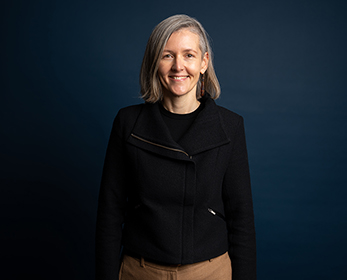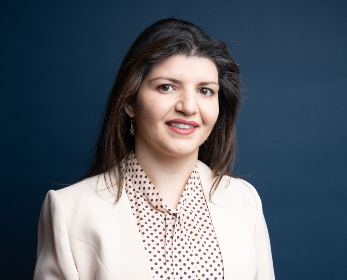This International Women's Day (IWD) Edith Cowan University is celebrating some of the trailblazing women in its midst.
IWD was officially recognised by the United Nations in 1977 as a day when women are celebrated for their achievements without regard to divisions, whether national, ethnic, linguistic, cultural, economic or political.
As we mark this international celebration, we reflect on our University's honoured namesake Edith Dircksey Cowan OBE, and what an incredible pioneer she was for women’s rights and educational progress in our country.
We also look forward to an ever-brightening future, with just a few of our great stories from women at ECU who share Edith's conviction that education is the key to growth, change and improvement in society.
Professor Cobie Rudd
Deputy Vice-Chancellor of Regional Futures and Vice-President, Edith Cowan University (ECU) and Head of ECU South West.
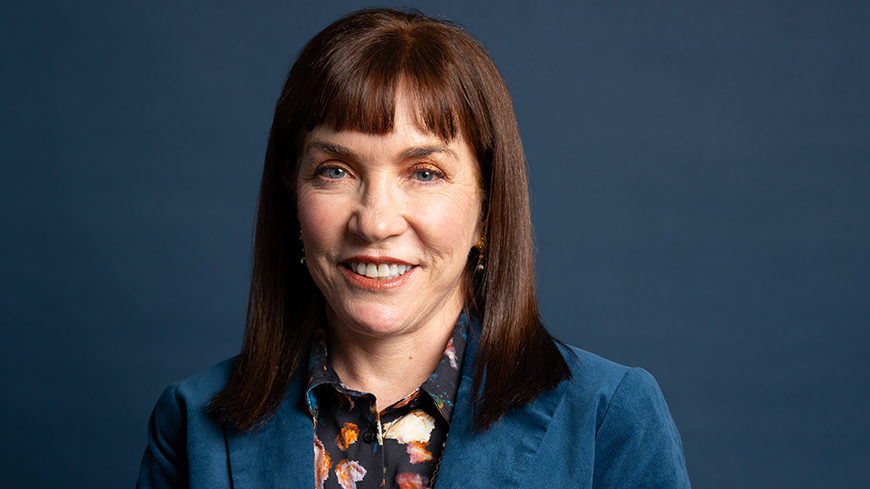 Professor Cobie Rudd.
Professor Cobie Rudd.
"When I think of Edith Dircksey Cowan, I think of her courage to work tirelessly to redress inequities, despite opposition. I think of her integrity to live her life in line with her deepest values of honesty and fairness, and her strength to hold firm in spite of overt resistance and hostility; that’s how she ultimately pioneered reforms that appealed to people's higher ideals. Edith's legacy was that she made the world within which she lived, such a better place for the following generations and forever enabled a different way of thinking. She made systemic changes, inspired others and didn’t fear change.
She lit the fuse, and it would have been impossible in Edith's time for a woman to have a background like mine; hence her lasting impact is very personal for me.
I’ve had 13 different and diverse careers so far, not just jobs. Growing up in Queensland, I never thought I couldn't do something I wanted to, and now that’s still evident in my work.
My approach to my work and to gender equality is to explore new ways – "So if not, why not?" I'm a bit surprised that 40 years later I am still having to ask that question when it comes to equal opportunities."
Diversity as a career journey
My earliest career was as a Medical Illustrator for the Queensland Institute of Medical Research, then I became a Cartoonist with my own cartoon column Insect Asides and developed 'leading characters', Batmite, Mozzie from Motham City, and Evel Kwievel.
Next, I studied to become a Registered Nurse and worked in hospitals, emergency departments, and maximum security inpatient mental health, and as an "Outreach Young People's Health Worker", I drove a City Council bus from Brisbane to the Gold Coast to work through the night with young people at risk, including adolescent sex workers. I also worked as a swimming, water safety and life-saving coach.
My not-for-profit sector career included me becoming a Head of Department in the Australian Red Cross.
As a public sector bureaucrat, I led various areas in the Queensland Government, including Community Outreach and Development, Program Development and as the Manager of Primary Health Care leading the Statewide implementation of a number of social justice health policies, including building 8 Primary Health Care Clinics and 11 Community Health Centres in Far North Queensland and lived in Aboriginal and Torres Strait Islander communities.
I then went on to become a National Policy Researcher and Policy Maker in Canberra.
When I moved into the private sector, I became a CEO and a consultant and then a small business owner-operator of a consultancy company. This all before I entered academia.
My current career, as a Higher Education Sector executive, has taken me from Head of School for ECU's then School of Nursing, Midwifery, Postgraduate Medicine and Paramedicine, to the Pro-Vice-Chancellor Health Advancement and ECU's inaugural Chair in Mental Health, and established the ECU Health Simulation Centre, the ECU Health Centre Wanneroo, and led innovations in learning and teaching, including as the Australian Government National Teaching Fellow for simulation-based and interprofessional learning.
Later, as the Deputy Vice-Chancellor of Strategic Partnerships, I had executive oversight of all of ECU’s professional accreditations for a decade and secured the new ECU Health Centre in Yanchep to deliver further increased clinical placement and research capacity and commenced as ECU’s Lead for Athena Swan in 2015.
Still fighting on the trail blazed by Edith
Since 2015, ECU has embraced the Athena SWAN charter, the international accreditation framework transforming gender equality.
This charter is based on ten key principles which commit to creating gender inclusive workplaces. ECU's membership shows a strong commitment to adopting the principles University-wide, within policies, practices, action plans and culture.
I have been very proud to lead the University's Athena Swan initiative. The Edith Cowan Athena Swan Advancement Scheme celebrates the gender diversity of our staff talent at ECU, supporting career progression in the spirit of the Science in Australia Gender Equity (SAGE) Ltd. Athena Swan Charter in Australia.
Under my leadership, ECU was in the first cohort that was awarded the Bronze Institutional Award in 2018 and following strict benchmarking and peer review by Science in Australia Gender Equity (SAGE), ECU was the very first institution in Australia to achieve a Cygnet Award in August 2022.
ECU has now achieved all required five Cygnet awards from SAGE – the highest number available.
We are the only university in WA to have achieved the full five required Athena Swan Cygnet Awards.
Bright futures in the regions
I am now Deputy Vice-Chancellor of Regional Futures, which also sees me as the University Vice-President who Heads ECU South West.
In the past two years, I have shifted ECU South West to major influencer status in the Region, including having achieved the new University Department of Rural Health South West and the State’s WA Creative Tech Innovation Hub spanning all nine regions, establishing the ECU Learning Centre Busselton, and forging 11 formal partnerships and strategic precinct development."
We asked Professor Rudd what inspired her to achieve in all the areas of her life and career each day?
"In March 2023, I was inducted into the WA Women's Hall of Fame for contributions to education and health, and continued efforts rectifying gender inequities in the workplace. This recognition is important as it tells me people are listening and that is what blazes the trail to light the way for others.
I'm a firm believer that you need to think carefully about what makes you happy and then do those things daily. Experiencing happiness will help keep you afloat and to be less distracted by ‘the noise’ of detractors and thus be more resilient for yourself and your own leadership journey. I am a big proponent of being resilient, happy and not fearing failure. And in turn, I don’t fear change.
I do gain a lot of joy from my work and making a positive difference and seeing those results. My advice to others is to seek out that alignment because it’s inextricably linked with resilience, and you can then adapt more easily in the face of adversity.
I always say, if you don't believe you're on the right path, then you're probably on the wrong path. If you can't answer yes to some key questions, then change your course, for example, it's good to be able to say you're not discouraged by hardship; you don't care too much what others think; and you don't have to compromise your principles in your role; because then, the past will not have power over you!
And always be brave – in terms of career decisions, if something is not the right fit for you, then don’t do it."
We asked Professor Rudd how important it was to celebrate women in the workforce, their successes and embrace female leadership?
"It's incredibly important that we don't take our foot off the accelerator in recognising women's successes, particularly because we have chronic under-representation of women in science leadership, a continuing loss of women in STEMM, and a wider need to improve the promotion and retention of women in general.
Stereotypes still persist and can then lead to self-doubt, negative internal dialogue and diminished confidence.
I regularly try and address that imposter syndrome with women at various stages in their careers and am a strong advocate of not losing optimism – if I think I can do something, I usually do and if I fail, it's not the worst thing anyway.
In fact, failure can be one of the best things that can happen to you if you use it as your motivation to succeed – there can be serious fringe benefits of failure including bouncing back stronger and more resilient with a broader perspective and deeper insights.
Everyone's leadership journey is highly personal. I think it’s important to tune in to what defines you as it will be your values, sense of self-worth, optimism and resiliency that should transcend any career choices you pursue.
Professor Rowena Harper
Deputy Vice-Chancellor of Education, Edith Cowan University.
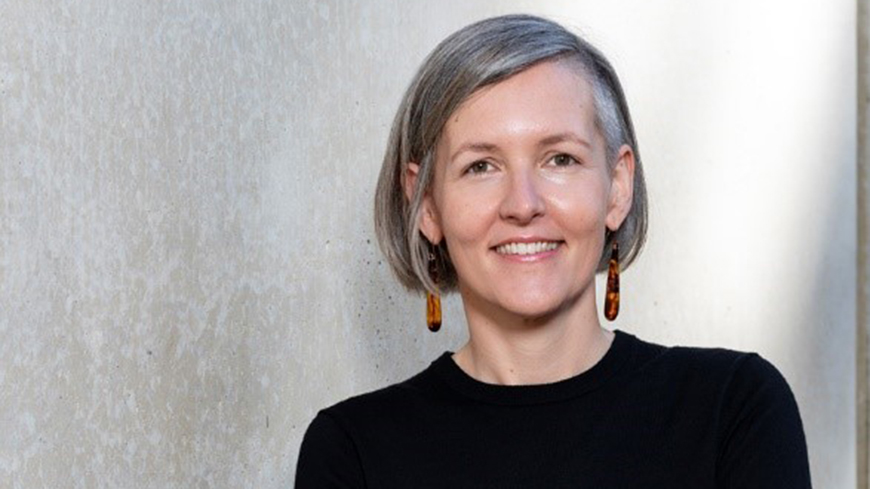 Professor Rowena Harper.
Professor Rowena Harper.
Professor Rowena Harper's experience spans over 20 years of practice, professional service and active research in higher education, where she is perhaps best known for her work in academic integrity and artificial intelligence.
"As a values-led educator I’m incredibly proud to work for Edith Cowan University (ECU) as the Deputy Vice-Chancellor (Education)." said Professor Harper.
"I am proud to share a deep passion for education with our University's namesake, Edith Cowan, who was such a remarkable advocate for the power of education in changing people’s lives."
Professor Rowena Harper has an exciting story to tell – there is good news on the education horizon for integrity and Artificial Intelligence (AI).
As a contributor on Assessment reform for the age of artificial intelligence Professor Harper has helped shape the national advice that will guide the higher education sector in its response to AI and sees, with good guidance/governance, a brighter future than some fear.
First in family to attend university
"I was among the first generation in Australia to benefit from the 'Dawkins Reforms', and the first in my family to attend university. While I didn't understand myself as having 'low socio-economic status' at the time, I grew up in a working-class outer suburb of Adelaide and had to work to support my study unlike many of my wealthy and private-school-educated peers.
Despite having no clear career goal and struggling early on, my higher education experience changed me as a person. Marginalisation, power and privilege.
As we celebrate International Women's Day it is interesting to reflect on how my Bachelor of Arts introduced me to the kinds of structural inequalities that impact participation and success in higher education. Through theories of class, gender, sexuality, race, culture, and ability I learned about my own marginalisation, and my own power and privilege. For these reasons, higher education is deeply important to me.
My career goal really emerged from my first semester in a classroom – I was electrified by the joy and fulfilment that come with teaching.
It's from here that my vision stems: we aim to create learning, teaching and student support environments that make a meaningful difference to students and their communities.
Passion driven research: the intersection of education, equity, integrity, and social good
As an educator who believes deeply in higher education, I've been fascinated by what prompts students to disengage from learning and outsource their work. Given this interest, my attention is now on artificial intelligence (AI), a challenge that sits at the intersection of everything I care most about: education, equity, integrity, and social good.
While AI no doubt has the potential to bring many benefits to society, it carries very real threats including bias and misinformation that could not only exacerbate social inequality but erode our capacity to intervene critically in its effects.
Professor Rowena Harper has a vision for the future world of higher education: "I hope we have the courage to question the apparent inevitability of new technologies, and collectively work to protect our diverse human interests through the ways we choose to develop and engage with AI."
Dr Masoumeh Zargar
Senior Lecturer and ARC DECRA Fellow, School of Engineering, Edith Cowan University
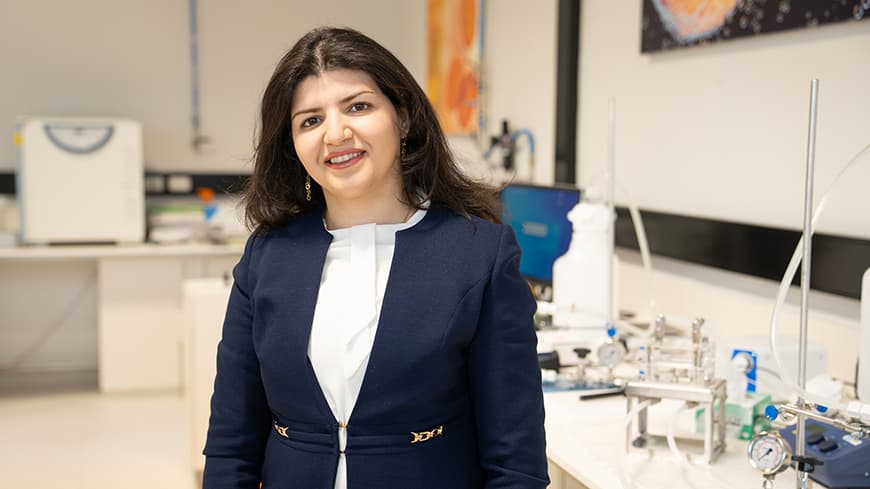 Dr Masoumeh Zargar.
Dr Masoumeh Zargar.
Dr Masoumeh Zargar's career journey into the complex discipline of chemical engineering research has, not surprisingly, been a very challenging one.
That journey began at Iran's oldest and most prominent university, the University of Tehran and has led her to produce ground-breaking research at Edith Cowan University to make the world’s drinking water safer.
Dr Zargar's passion to find solutions to real world problems saw her awarded a prestigious Discovery Early Career Researcher Fellowship Award (DECRA) by the Australian Research Council (ARC), which is enabling her to continue this important research.
Tremendous potential for revolution
Dr Zargar is developing 'smart' materials and membranes that can significantly contribute to preserving the health of Australia's vital water systems, ensuring sustainable access to clean water for communities across the country – crucial in addressing pressing environmental challenges.
This innovation holds tremendous potential to revolutionise water treatment methods globally, to change the way drinking water is treated around the world, starting right here in Australia.
Our existing wastewater treatment plants aren't properly designed to remove these tiny particles from water, so they end up in our oceans, rivers and lakes or even in our drinking water.
Dr Zargar's ground-breaking research has delivered the most time and cost-effective methods of making water safer to stop the harmful effects on human health and improving the sustainability of water treatment systems.
Figures of influence
"My journey in chemical engineering has been influenced by several significant figures in my life. My parents ignited my curiosity for science, laying the foundation for my pursuit in this field and my husband has played a pivotal role as a key supporter of my research aspirations.
Since joining ECU, I've been strongly supported, and the guidance and mentorship I have been given by my university supervisors has been instrumental in shaping my passion for impactful research."
Dr Zargar, herself now a figure of influence, says from the moment she started at ECU she has been focused on gender equality and actively engaged in supporting women's careers in STEM (the academic discipline of science, technology, engineering, mathematics).
Dr Zargar is an Athena Swan Champion – the international accreditation framework with proven success in transforming gender equality action and creating inclusive workplaces which has been embraced by ECU.
"As a lecturer and research mentor for women in ECU's School of Engineering, my primary challenge is nurturing an inclusive environment that fosters belief and confidence among female students, particularly in chemical engineering research.
Empowering them to recognise their own capabilities in a predominantly male-dominated field is crucial. Bridging the gap between theoretical knowledge and hands-on applications in these areas presents a significant challenge. It involves not only imparting a deep understanding of complex environmental and industrial issues but also igniting their self-belief to innovate within the discipline.
I find immense reward in guiding and witnessing the transformation of these women within STEM. Being part of their journey and witnessing their growth and achievements reaffirms my belief in the incredible potential women possess in STEM fields.
Through my experiences with undergraduates, postgraduates, and doctoral candidates, I've seen their remarkable capabilities and I'm committed to nurturing unshakable self-belief in them."
Diverse perspectives are invaluable assets
Dr Zargar was asked about becoming a role model for women researchers and women in STEM, and whether she had any advice for how women can succeed and thrive within their own research careers?
"Absolutely, it's been an incredible journey navigating the world of research as a woman in STEM. My advice for women aiming to succeed and thrive in their research careers is multifaceted but deeply rooted in personal belief and resilience," said Dr Zargar.
"Firstly, embrace your uniqueness and let it shine in your work. Our diverse perspectives and approaches are invaluable assets in the research landscape. Be proud of your voice and the innovative lens you bring to the table.
Secondly, never underestimate the power of your network. Cultivate meaningful, healthy connections within your field, seek mentors who inspire you, and build a support system of peers who uplift and motivate you. Collaboration and mentorship are key drivers of growth and success.
Thirdly, don't shy away from challenges; instead, view them as opportunities for growth. The path to success isn't always linear, but every setback or obstacle is a chance to learn and evolve."
Speak up, amplify voices
Dr Zargar says that "lastly, advocate for yourself and others. Speak up, amplify voices, and strive for equity in every opportunity."
"Your advocacy not only uplifts you but also paves the way for those who come after you. Remember, your journey is unique, and your contributions are invaluable. Embrace the challenges, nurture your passions, and never doubt the impact you can make. You're not just building a career; you're shaping the future of STEM."

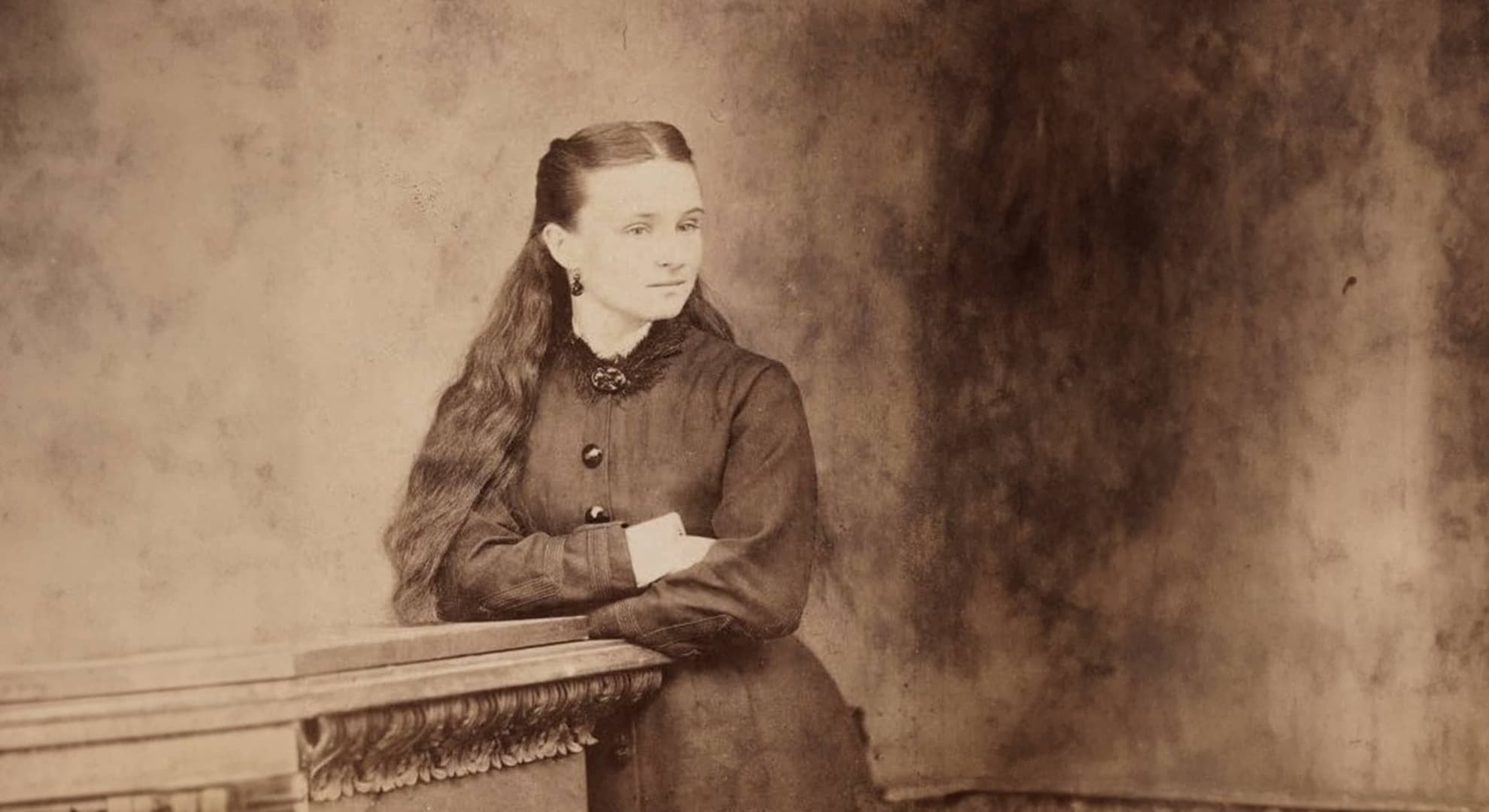 Honouring Edith Dircksey Cowan OBE.
Honouring Edith Dircksey Cowan OBE.

